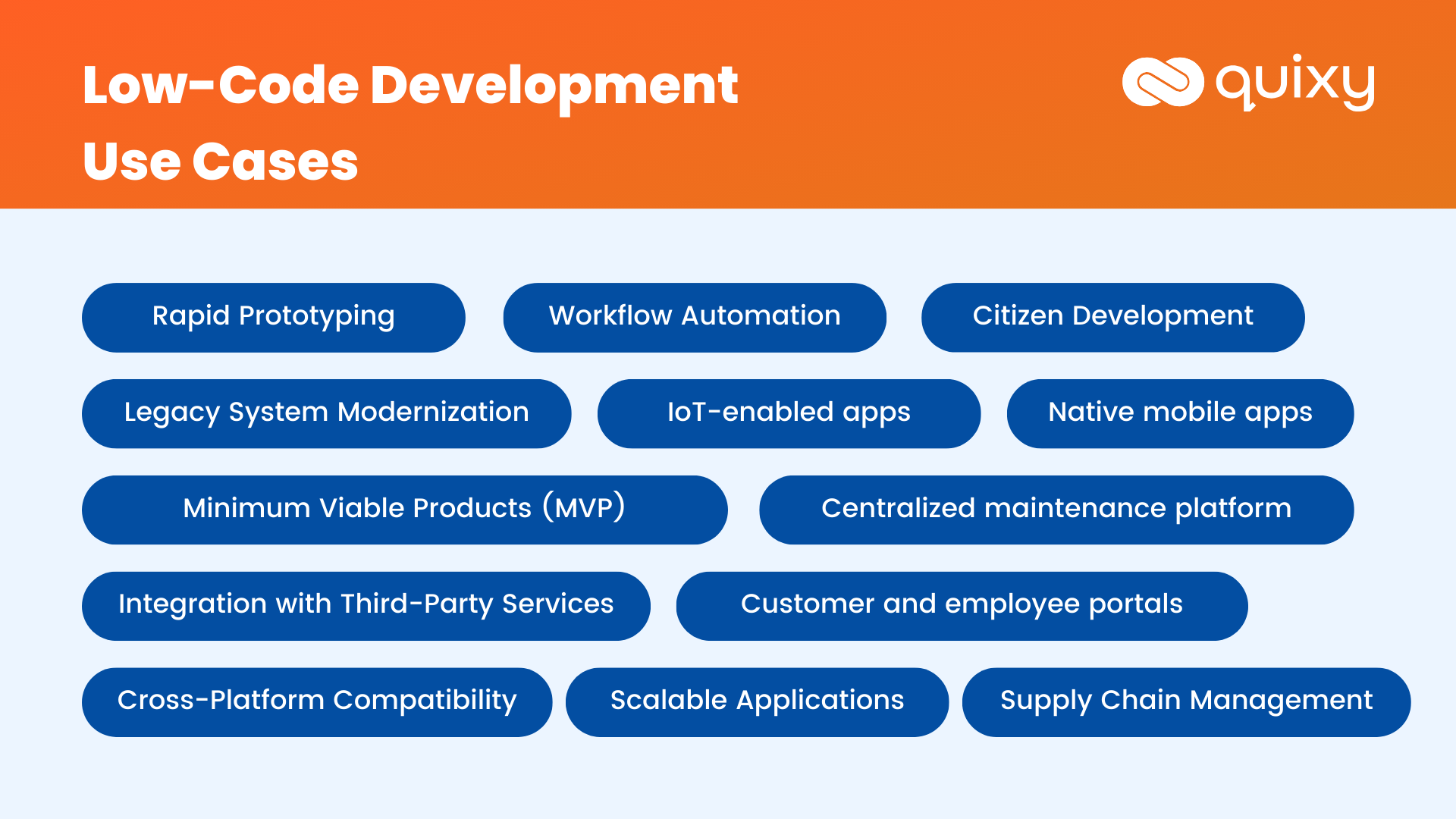
In the fast-paced world of software development, efficiency and agility are essential. Low-code development has emerged as a powerful solution to meet these demands, offering a streamlined approach to building applications with minimal hand-coding. This article delves deep into low-code use cases, exploring how it can revolutionize various industries and help businesses stay ahead in the digital age.
Understanding Low-Code Development
Before diving into the specific low-code use cases, let’s understand what low-code automation is.
Low-code development is an approach to software development that emphasizes visual development tools, drag-and-drop functionality, and minimal coding effort. It enables developers and non-developers to create applications swiftly, significantly reducing the traditional development timeline.
Low-Code Use Cases

Use Case 1: Rapid Application Prototyping
One of the primary use cases of low-code development is rapid application prototyping. Companies need to test their ideas quickly in today’s dynamic business environment. With low-code platforms, businesses can create prototypes of their software solutions in a matter of days, allowing for faster validation of concepts.
Use Case 2: Legacy System Modernization
Many organizations still depend on legacy systems that are costly to maintain and lack the flexibility needed for modern business operations. Low-code development can come to the rescue by enabling the gradual modernization of these systems. By building new modules or integrating with existing systems, businesses can extend the life of their legacy software while embracing new technologies.
Also Read: Why Legacy Enterprise Systems must be replaced?
Use Case 3: Citizen Development
Not everyone in an organization is a professional developer, but many employees have valuable insights into business processes that can be leveraged for innovation. Low-code platforms empower citizen developers without formal coding backgrounds to create applications that address specific business needs. Citizen development democratization of software development fosters innovation at all levels of the organization.
Use Case 4: Scalable Applications
As businesses grow, so do their software needs. Scaling up traditional development can be time-consuming and costly. Low-code development allows companies to scale their applications quickly. Whether it’s adding new features, accommodating more users, or expanding to new markets, low-code platforms provide the agility needed to adapt to changing business requirements through app development.
Use Case 5: Cross-Platform Development
In a multi-device world, delivering a consistent user experience across various platforms is essential. Low-code development tools often come with built-in cross-platform capabilities, enabling developers to create applications that work seamlessly on desktops, tablets, and smartphones. This versatility saves both time and resources in the development process.
Use Case 6: Integration with Third-Party Services
Modern applications often rely on many third-party services, from payment gateways to social media APIs. Low-code platforms make it easy to integrate these services into your applications. This streamlines the development process and ensures your software can use the latest technologies and services available.
Use Case 7: Workflow Automation
Efficiency is crucial in today’s competitive landscape. Low-code development enables organizations to automate repetitive tasks and streamline workflows. Whether it’s automating document approvals, managing customer inquiries, or optimizing supply chain processes, low-code platforms can be tailored to meet specific automation needs.
Also Read: Digital Process Automation – Everything You Need to Know
Use Case 8: Minimum Viable Products (MVP)
Building a Minimum Viable Product (MVP) is a critical step in product development. Low-code development allows companies to create MVPs quickly and cost-effectively. This means getting your product into the market faster, gathering user feedback, and iterating based on real-world usage.
Use Case 9: Supply Chain Management
Efficient supply chain management is crucial for businesses across industries. Low-code development can be used to create customized supply chain management solutions tailored to your organization’s unique needs. This can include real-time tracking, inventory management, and demand forecasting.
Use Case 10: Native Mobile Apps
Mobile apps are a must-have for businesses aiming to reach a wider audience. With low-code development, you can build native mobile apps for iOS and Android without extensive coding. This opens up new opportunities for engaging with customers on their preferred devices.
Use Case 11: Customer and Employee Portals
Enhancing the customer and employee experience is a top priority for businesses. Low-code development enables the creation of user-friendly portals that cater to both customers and employees. These portals can offer self-service options, access to information, and interactive features, improving overall satisfaction.
Also Read: Low-Code or No-Code Which Solution Best Fits Your Needs?
Use Case 12: Centralized Maintenance Platform
Managing and maintaining software applications can be a daunting task, especially when dealing with a diverse portfolio. Low-code development can be used to create a centralized maintenance platform that simplifies updates, bug fixes, and monitoring. This ensures that your software remains reliable and up-to-date.
Industries that can benefit from Low-Code
Low-code development has emerged as a game-changing solution for various industries. Its ability to accelerate application development, reduce costs, and empower non-technical users makes it a versatile tool that can benefit a wide range of sectors. Let’s explore the industries that can harness the potential of low-code to drive innovation and efficiency.
Banking and Finance
In the highly regulated and data-driven world of banking and finance, agility is paramount. Low-code development enables financial institutions to quickly adapt to changing market conditions by building and modifying applications on the fly. Whether it’s creating customer-facing mobile apps or streamlining internal processes, low-code empowers the financial sector to stay competitive.
Healthcare
The healthcare industry faces constant pressure to enhance patient care and optimize administrative processes. Low-code development can be a lifeline for healthcare organizations, allowing them to create custom solutions for patient record management, appointment scheduling, and telemedicine platforms. These tailored applications improve patient outcomes and operational efficiency.
Manufacturing
Efficient production and supply chain management are the cornerstones of the manufacturing sector. Low-code development can be used to build real-time monitoring systems, quality control applications, and inventory management solutions. By harnessing the power of low-code, manufacturers can reduce downtime, improve product quality, and respond swiftly to market demands.
Retail and E-Commerce
Retailers and e-commerce businesses rely on dynamic, user-friendly platforms to engage customers and drive sales. Low-code development enables the rapid creation of mobile apps, e-commerce websites, and customer relationship management (CRM) tools. This agility is essential for adapting to changing consumer preferences and delivering exceptional shopping experiences.
Education
The education sector has witnessed a digital transformation, with a growing need for online learning platforms and administrative systems. Low-code development simplifies the creation of e-learning platforms, student management systems, and faculty portals. It empowers educational institutions to provide flexible learning solutions and streamline administrative tasks.
Government
Government agencies often grapple with complex processes and the need to deliver services efficiently. Low-code development can help automate citizen services, streamline permit and license applications, and enhance transparency through data-driven dashboards. This fosters citizen engagement and improves government operations.
Energy and Utilities
Energy and utility companies manage vast infrastructure networks and complex operations. Low-code development can be used to build applications for asset management, field service management, and energy consumption monitoring. These tools improve infrastructure reliability and resource optimization.
Insurance
The insurance industry deals with vast amounts of data and complex calculations. Low-code development can streamline claims processing, policy management, and customer interaction. It enables insurers to enhance customer experiences and respond swiftly to changing market conditions.
Nonprofit and Social Services
Nonprofit organizations and social services agencies often operate with limited resources. Low-code development allows them to create donation platforms, volunteer management systems, and case management solutions. These applications improve their ability to deliver critical services to those in need.
Transportation and Logistics
Efficient logistics and transportation are crucial for the movement of goods and people. Low-code development can optimize route planning, track shipments in real-time, and automate scheduling. This leads to cost savings and improved customer satisfaction in the transportation industry.
Real Estate
The real estate sector relies on effective property management, client communication, and data analysis. Low-code development can be used to create property listing platforms, CRM systems, and analytics dashboards. This streamlines real estate operations and improves client engagement.
Entertainment and Media
The entertainment and media industry thrives on innovation and content delivery. Low-code development can facilitate the creation of content management systems, media distribution platforms, and audience engagement apps. It allows companies to adapt to changing content consumption trends.
Legal Services
Law firms and legal services providers can benefit from low-code solutions for case management, document generation, and client communication. These tools enhance efficiency, reduce administrative overhead, and improve client service.
Agriculture
Agriculture is increasingly leveraging technology to optimize crop management, irrigation, and supply chain processes. Low-code development can be used to create precision agriculture applications, weather monitoring systems, and farm management tools. This improves crop yields and resource utilization.
Hospitality and Tourism
The hospitality and tourism industry relies on guest satisfaction and efficient operations. Low-code development can enhance booking systems, customer loyalty programs, and hospitality management platforms. It enables businesses to provide personalized experiences to guests.

Conclusion
Low-code development has become a game-changer in the software development landscape. Its versatility & efficiency make it a valuable tool for businesses across various industries. From rapid prototyping to legacy system modernization and citizen development, the use cases are diverse and promising.
As businesses continue to look out for innovative solutions to stay competitive, embracing low-code development may be the key to unlocking new possibilities. With the power to create applications quickly, integrate third-party services, and automate workflows, low-code development is not just about writing less code; it’s about achieving more.
Low-code development is not just a trend; it’s a transformational force that can propel your business forward in the digital era. So, don’t wait—start your low-code journey today with Quixy!
Frequently Asked Questions (FAQs)
Q. How Can Low-Code Modernize Legacy Systems?
Low-code modernization revitalizes legacy systems by seamlessly integrating new features and technologies. This extends the life of these systems, making them more versatile and capable.
Q. What Are the Key Advantages of Low-Code for Rapid Prototyping?
Low-code accelerates software prototyping, enabling swift idea validation and shorter development cycles. It’s a tool for turning concepts into reality at a faster pace.
Q. How Does Low-Code Support Citizen Development?
Low-code empowers non-developers to innovate by creating customized applications tailored to specific business needs. It fosters innovation across all organizational levels.
Q. Can Low-Code Solutions Scale with Business Growth?
Yes, low-code platforms offer scalability, making it easy for businesses to expand applications, introduce new features, and accommodate growth with minimal effort.
Q. What Is the Role of Low-Code in Cross-Platform Development?
Low-code streamlines the integration of third-party services, such as payment gateways and APIs, ensuring applications can harness the latest technologies effortlessly.
Q. how can I use low-code in my organization?
To implement low-code in your organization, assess needs, select a suitable platform, and train your team. Start with a small pilot project and gradually scale up. Focus on projects with clear requirements and moderate complexity. Design, develop, test, and deploy, gathering feedback along the way. Ensure governance and security, foster collaboration, and measure success with key performance indicators (KPIs). Low-code can streamline processes, reduce development time, and enhance efficiency across various business functions.
Q. How to assess if the project is suitable for low-code development?
Assess project complexity, customization, and timelines. Low-code suits simple, standardized tasks with minimal coding. For customizations, complex integrations, or scalability needs, traditional development may be better. Opt for low-code for rapid prototyping and tight deadlines. Match project requirements with low-code capabilities.
Login
Please login to comment
0 Comments
Oldest















